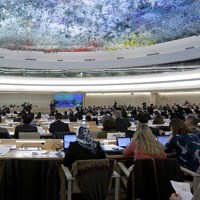Did the liberal international order get a little less liberal last week? Western diplomats and human rights activists faced an accumulation of challenges across the United Nations system. On Tuesday, the General Assembly elected a clutch of repressive regimes—including China, Russia, Saudi Arabia and Vietnam—to the Human Rights Council. On Friday, African countries forced a showdown in the Security Council over the International Criminal Court’s (ICC) pursuit of Kenyan President Uhuru Kenyatta and Vice President William Ruto for stirring up election-related violence in 2007, accusing the U.N. of disrespect for Africa.
To pessimistic observers, these developments are symptomatic of a slow erosion of Western influence and liberal principles in multilateral affairs, the latest skirmishes in a long diplomatic war of attrition over values that has ebbed and flowed in multilateral organizations for decades. After the Cold War, liberal principles appeared to be in the ascendant, especially in U.N. forums. Victories included the creation of the ICC and the emergence of the Responsibility to Protect (R2P) principle as a recognized norm. Yet the Iraq crisis, China’s rise and Western economic weakness during the financial crisis interrupted the consolidation of such liberal mechanisms and norms.
In 2008, for example, Franziska Brantner and I argued that the European Union, the self-appointed vanguard of liberal internationalism, faced a “slow-motion crisis at the United Nations” as China, Russia and other non-Western powers exercised increasing influence in U.N. forums. Beijing, Moscow and their allies insisted that the U.N. cut back its human rights monitoring of countries such as Belarus and Cuba, and while the EU protested, the Bush administration simply boycotted the Human Rights Council.

